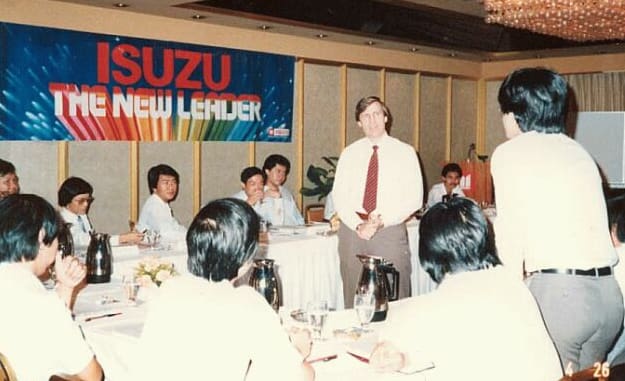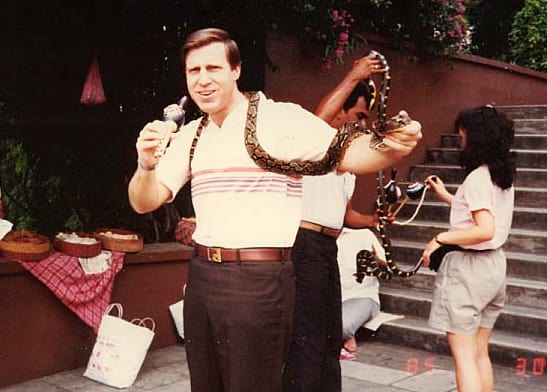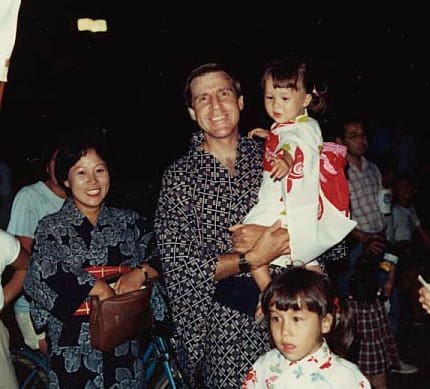ここからはRonさんのビジネストリップ物語、80か国以上を訪問、の話です。
目的はもちろん海外の営業拠点での営業のトレーニング。
それまでのいすゞ自動車にはないRonさんならではのトレーニングを行いました。
最初のトレーニングは1985年のシンガポール。
私がアジアに初めて目を向けたのは、1994年、米系のコンサル会社にいるときでした。
その後、半導体装置の会社の海外営業に移り、シンガポール初訪問は1997年でした。
中国系がビジネスの実権を握り、マレー系、インド系が安価な労働力を提供といった構造でした。
では、Ronさんのビジネストリップ物語の始まりです。
Chapter #9: TRAVELING & TEACHING IN THE 1980’S
Singapore
As I mention earlier, my first training business trip was in Singapore on April 26-29, 1985. That is where 20 years of international travel to give seminars started.
As I look back, that was not a particularly good seminar, but it was far better than what Isuzu Motors ever did before, to develop its sales network international. So, simply put, I had an easy act to follow. In some cases, previous training was not even understandable, not to mention helpful. So, that is where the rocket took off.
Singapore is a city-state, a country of one city at the south of Peninsula Malaysia. It is a major trading port because of its location. It used to be a colony of England and therefore English (British English) is the most commonly used language. About 80% of the population are Chinese with a small percent of Malay and a smaller population from Indian.
Historically, being a British Colony, it was the ideal place to import machinery and finished goods from England and export raw materials, mostly natural rubber, tin and palm oil from Malaysia to England.
In recent years, as it is on the oil route from the Middle East to the United States, it is a major stop-over for tankers and has developed its own petro-chemical industry. With its extremely high level of education and being multi-lingual, it also is very involve in the computer and electronic industry.
It is very close to the equator, and therefore is very tropical with a lot of rain.


Uploaded by Nobi Saito
目的はもちろん海外の営業拠点での営業のトレーニング。
それまでのいすゞ自動車にはないRonさんならではのトレーニングを行いました。
最初のトレーニングは1985年のシンガポール。
私がアジアに初めて目を向けたのは、1994年、米系のコンサル会社にいるときでした。
その後、半導体装置の会社の海外営業に移り、シンガポール初訪問は1997年でした。
中国系がビジネスの実権を握り、マレー系、インド系が安価な労働力を提供といった構造でした。
では、Ronさんのビジネストリップ物語の始まりです。
Chapter #9: TRAVELING & TEACHING IN THE 1980’S
Singapore
As I mention earlier, my first training business trip was in Singapore on April 26-29, 1985. That is where 20 years of international travel to give seminars started.
As I look back, that was not a particularly good seminar, but it was far better than what Isuzu Motors ever did before, to develop its sales network international. So, simply put, I had an easy act to follow. In some cases, previous training was not even understandable, not to mention helpful. So, that is where the rocket took off.
Singapore is a city-state, a country of one city at the south of Peninsula Malaysia. It is a major trading port because of its location. It used to be a colony of England and therefore English (British English) is the most commonly used language. About 80% of the population are Chinese with a small percent of Malay and a smaller population from Indian.
Historically, being a British Colony, it was the ideal place to import machinery and finished goods from England and export raw materials, mostly natural rubber, tin and palm oil from Malaysia to England.
In recent years, as it is on the oil route from the Middle East to the United States, it is a major stop-over for tankers and has developed its own petro-chemical industry. With its extremely high level of education and being multi-lingual, it also is very involve in the computer and electronic industry.
It is very close to the equator, and therefore is very tropical with a lot of rain.


Uploaded by Nobi Saito























